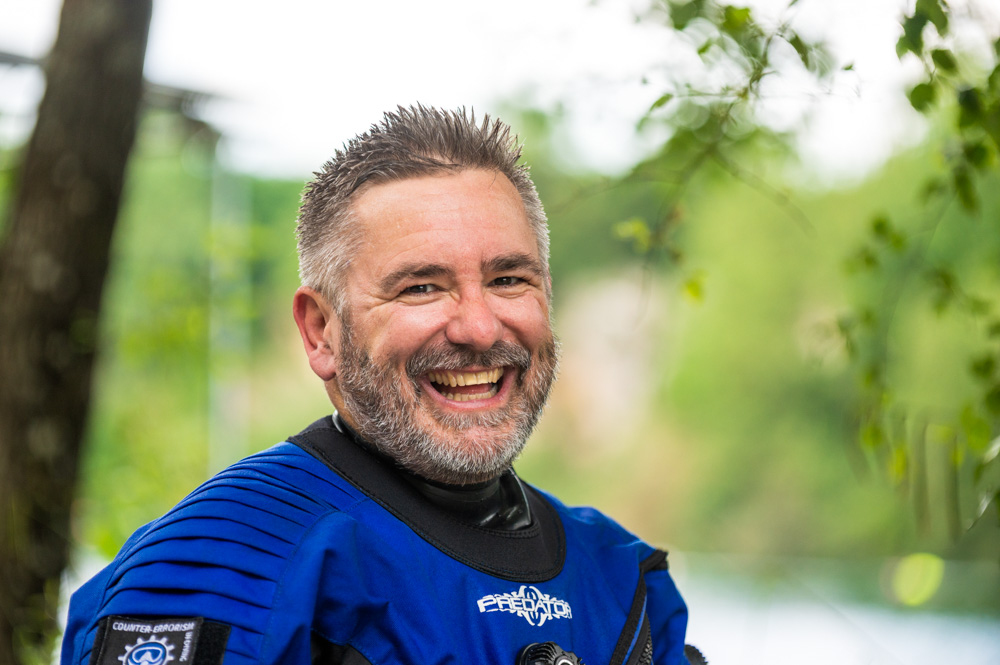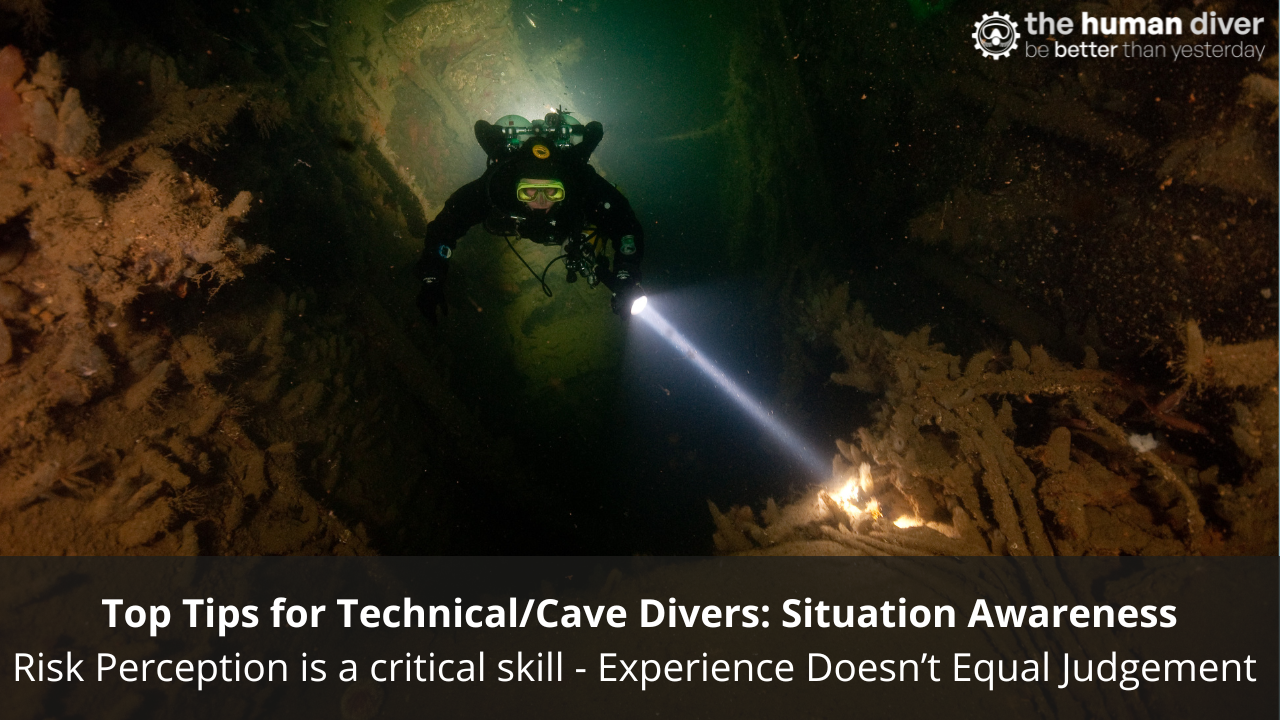
The need for a different perspective: Who to blame? What conditions to learn from?
Mar 19, 2023Accidents, incidents and near misses occur in diving every day. Fortunately, most of them don’t end up with a serious or fatal outcome. While the media focus in diving safety is on the fatalities because they are emotive and public, there are more lessons that can be learned from incidents and near misses. In fact, it could be argued that if we have a psychologically-safe environment or a Just Culture, more can be learned from a near-miss or incident because we are more likely able to have a conversation with those involved.
However, some would argue that there isn’t anything to be learned when looking at diving incidents because the issues are already known: out of gas, severe DCI, entanglement, separation, or rapid ascent/uncontrolled ascent, plus some other examples of adverse events. At the same time, these are outcomes and focusing on these doesn’t help us to learn because we can’t directly prevent an outcome, but can monitor for, adapt to, and or change the conditions that lead to the events. The fundamental attribution error means that we will look to blame individuals for adverse outcomes based on their cognitive, psychological, or physical performance shortfalls, without looking at their context or the situation they were in. Telling someone to ‘pay more attention’ or ‘be more careful’ doesn’t change their decision-making processes if they don’t know WHAT to look for as a situation develops or whether their attention was on something else perceived to be more important by them.

One area of the safety research and literature shows that we can look at an event through one of two lenses, and because we construct meaning from how we view something, these two approaches can lead to two very different conclusions to the ‘causality’ of an adverse event.
The first is the individual blame logic (IBL) which is an accusatory type of approach which tries to identify the guilty individuals. This approach is typical of criminal law but is also prominent in organisations based on a punitive culture. More generally, this approach fits in with the wish of society to identify a clear cause for the accident.
The second is the organisational function logic (OFL) which is an organisational and functional type of approach which intends to identify the factors within the system which favoured the occurrence of the event. In this second approach, once these factors are removed, it is hoped that similar events will not happen again or will occur less frequently and less probably.
The Individual Blame Logic (IBL)
The IBL is based on the following beliefs:
- Voluntary nature of actions – choices: People are considered free agents who choose to make safe or unsafe decisions, and so when things go wrong, it must be because of incompetence, lack of attention, inaccuracy, or ‘not being careful’.
- Individual responsibility: we are all responsible for our actions, linked with the legal approach that looks for the person who is responsible (another way of saying blame).
- Justice is served: Once we’ve found someone to blame or to hold responsible, we feel much better emotionally.
- Convenience: if we find an individual to pin the fault on, we don’t have to look further back up the system or in time and identify organisational or systemic weaknesses. This saves time and money, and also allows an organisation to maintain their perception of control and power i.e., follow the rules otherwise accidents will happen.
The IBL aligns with the Western legal system – find the individual responsible and punish them accordingly. Once the punishment has been delivered (and is made public), it will deter other people from behaving in this same errant way. However, in most cases, adverse outcomes are down to the inability to predict with 100% accuracy what the future will look like and adjust our behaviours/actions accordingly. Safety isn’t necessarily about following rules, but non-compliance is often part of the evidence to show that the individual was at fault, even if the non-compliance had nothing to do with the accident nor is it possible to be compliant! Fundamentally, it is easier to identify the ‘last to touch it’ than look back through the system to identify the multiple factors that came together and led to the adverse event.

The Organisational Function Logic (OFL)
The OFL is based on the assumption that failure is part of the human condition, and if we cannot change the human condition, then the conditions under which human beings work can be changed. Consequently, the organisational model views human error more as an outcome or consequence, rather than a cause. The IBL focuses on the individual, whereas the OFL looks at the conditions, context and latent factors within the organisational context and activity. The OFL doesn’t ignore ‘human error’ but recognises that it is the ‘final straw that breaks the camel’s back’ when there are multiple factors or influences in the system that set the individual up for failure rather than success. A key aim of the OFL is to learn from errors and accidents, which then leads to the identification of the contextual conditions and latent factors that can increase the likelihood of an adverse event.
The table below summarises the key differences between the IBL and OFL.

Case Example
An OW diver was diving in a remote offshore location from a liveaboard. On the 4th dive of the 4th day, where they had been to 25-30m, they intentionally surfaced despite having 18 mins of decompression showing on their computer. They suffered severe DCS and required emergency evacuation that took 18 hours from surfacing to arriving in a decompression chamber.”
An IBL-type narrative.
The diver was not qualified for the dives that they were undertaking. They were not experienced in the environment they were in. They should have followed their dive computer and ignored the dive guide's directions to ascend and miss 18 minutes of decompression. On the surface, they did not declare that they felt unwell. The boat crew did not respond in a timely or professional manner, and it required one of the divers to take control of the situation and arrange the evacuation of the injured diver.
An OFL-type narrative.
The dive took place shortly after COVID restrictions had been rescinded. COVID had major financial implications on the financial viability of the boat operations and client levels were lower than normal. The level of required experience of clients was dropped to ensure that places were filled – AOW should be the minimum certification level for this location because of the depths involved (although certification and experience are not necessarily coherent). The reduction in liveaboard income reduced the ability of the crew to remain competent in emergency skills and the serviceability of safety equipment and provision of O2 also suffered. The subject diver was inexperienced, and it is believed they suffered from DCS on dive 2 of day 4 but didn’t not recognise this, entering the water for 2 more dives on day 4. The diver would have been subject to authority gradient when the dive guide said ascend; authority gradient would have made it hard to counter the direction from the guide. The guide’s computer was clear, but this could have been due to different conservation factors and different dive profiles. The dive boat had recently lost a small support vessel the previous week due to large waves, and this may have also biased the guide's decision to ascend if they were close to the reef. The diver’s travel insurance had expired, but a fellow passenger arranged for insurance coverage and the medical evacuation. The dive location is remote, which means that even if insurance is available, the time to treatment is massively increased with a commensurate reduction in recompression treatment effectiveness. This means that competency needs to be high and risk exposure should be reduced.
As you can see, there are multiple organisational and latent conditions that can be seen if we take an OFL approach to tell the story. Even this narrative misses many contributory and influential factors that were not able to be explored – this story was collated from multiple accounts on social media.

Summary
An environment that involves people is always complex – we can’t repeat the same situation and decisions, and sense is made after the event not prior. In a complex system, the simple punishment of a diver (which could be through social retribution) for an incident, accident, or near-miss, without assessing the deficiencies of the system, means favouring the repetition of unfavourable events also with other actors. Our behaviour is a function of the environment we are in. Diane Vaughan, the person who coined the term ‘normalisation of deviance’ following the Challenger loss, said “…every remedy which is limited only to individuals leaves the structural origin of the problem unvaried”.
The OFL looks to improve the system and the organisations by focusing on the future, whereas the IBL looks to punish the individual and does not change the conditions surrounding the risk or uncertainty. Expecting the application of a punitive approach via criminal or civil law to make improvements to the safety of the system is flawed because fear does not facilitate learning, rather it leads to learning opportunities being hidden.
References:

Gareth Lock is the owner of The Human Diver, a niche company focused on educating and developing divers, instructors and related teams to be high-performing. If you'd like to deepen your diving experience, consider taking the online introduction course which will change your attitude towards diving because safety is your perception, visit the website.
Want to learn more about this article or have questions? Contact us.










